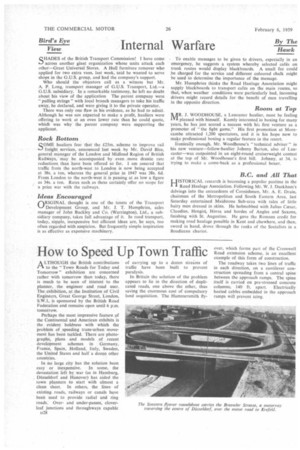Internal Warfare
Page 70

If you've noticed an error in this article please click here to report it so we can fix it.
Bird's Eye View
By The Hawk
QHADES of the British Transport Commission! I have come across another giant organization whose units attack each other—Great Universal Stores. A Hull furniture remover who applied for two extra vans, last week, said he wanted to serve shops in the G.U.S. group, and had the company's support.
Who should the objectors call as a witness but Mr. A. P. Long, transport manager of G_U.S. Transport, Ltd.—a G.U.S. subsidiary. In a remarkable testimony, he left no doubt about his view of the application The parent company were "pulling strings" with local branch managers to take his traffic away, he declared, and were giving it to the private operator.
There was only one flaw in his evidence, as he had to admit. Although he was not expected to make a profit, hauliers were offering to work at an even lower rate than he could quote, which was why the parent company were supporting the applicant.
Rock Bottom
SOME hauliers fear that the £25m. scheme to improve rail freight. services, announced last week by Mr. David Blee, general manager of the London and Midland Region of British Railways, may be accompanied by even more drastic rate reductions. than have been offered so far. I am assured that traffic from the north-west to London is now being accepted at 38s. a ton, whereas the general price in 1947 was 38s. 6d. From London to the north-west it is passing at as low a figure as 34s. a ton. Rates such as these certainly offer no scope for a price war with the railways.
Ideas Encouraged
OR1G1NAL thought is one of the tenets of the Transport Development Group, and Mr. J. T. Humphries, sales manager of John Buckley and Co. (Warrington), Ltd., a subsidiary company, takes full advantage of it. In road transport, today, simple, inexpensive but efficient ideas are, be says, too often regarded with suspicion. But frequently simple inspiration is as effective as expensive machinery.
To enable messages to be given to drivers, especially in an emergency, he suggests a system whereby selected cafes on trunk routes would display blackboards. A small fee could .be charged for the service and different coloured chalk might be used to determine the importance of the message.
Mr. Humphries thinks the Road Haulage Association might supply blackboards to transport cafes on the main routes, so that, when weather conditions were particularly bad, incoming drivers might record details for the benefit of men travelling in the opposite direction.
Room at Top
kip. J. WOODHOUSE, a Lancaster haulier, must be feeling IVI pleased with himself. Keenly interested in boxing for many years, he has just scored a success with his first venture as a promoter of "the fight game." His first promotion at Morecambe attracted 1,200 spectators, and it is his hope now to make professional boxing a regular feature in the resort.
Ironically enough, Mr. Woodhouse's **technical adviser" in his new venture—fellow-haulier Johnny Barton, also of Lancaster—was outpointed in an eight-round cruiserweight contest at the top of Mr. Woodhouse's first bill. Johnny, at 34, is trying to make a come-back as a professional boxer.
B.C. and Ali That
H1STORICAL research is becoming a popular pastime in the Road Haulage Association. Following Mr. W. J. Duckham's delvings into the antecedents of Cornishmen, Mr. A. E. Drain, chairman of the Metropolitan and South Eastern Area, last Saturday entertained Maidstone Sub-area with tales of little hairy men dressed in skins. He hobnobbed with Julius Cmsar, Claudius, Hengist„ Horsa and hordes of Angles and Saxons, finishing with St. Augustine. He gave the Romans credit for making road haulage possible in Kent and elsewhere, and then, sword in hand, drove through the ranks of the Socialists in a Boadicean chariot.




























































































































